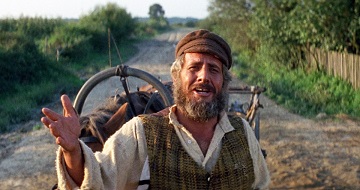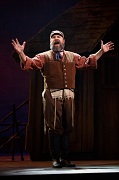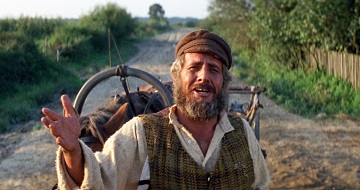
Author’s Note: This is a speech I gave over 50 years ago at a luncheon of the Yeshiva University Women’s Organization a few years after I graduated from Stern College. (I was in the first class of SCW and the first president of the SCW Undergraduate Association.) My mother, Rosalind Rosenbaum, a”h, saved many of our report cards, news articles, term papers, etc., and I just found this among her boxes. It is very timely. I had just come back from seeing the new version of “Fiddler” on Broadway. I was so upset with it, especially the conclusion. Tevye, who had been wearing tzitzit, a jacket and a hat throughout the play, is now on his way to America. He last appears on the stage bareheaded, wearing a red, puffy jacket and not wearing his tzitzit. So much for “tradition!” (P.S. I did not applaud for the curtain calls.)

“Tradition! Tradition!” Does that sound familiar? Those are lyrics from the song in “Fiddler on the Roof,” but I have a variation I like much better. Mine goes, “Education! Education!”
But first, to put things in context, let’s compare the lives of two Jews—Sholom Aleichem’s Reb Tevye, the dairyman, and my zayde, Reb Dovid, the businessman.
Sholom Aleichem, the author of “Fiddler,” was a “Yiddishist,” a person who viewed the pre-World War II Yiddishkeit of Eastern Europe as old-fashioned. He believed Jews can and should be integrated into non-Jewish society. He felt Jews must emerge from their ancient traditions and blend harmoniously with the world at large. Hidden in the story of “Fiddler” is the breakdown of tradition and beliefs in the shtetl under pressure from social change and hostile forces.
The tragedy of Reb Tevye is that he is an ordinary Jew from a tiny town in Eastern Europe who is bound to his traditions as he watches his daughters slowly break away from them.
His oldest marries for love and not money—nothing wrong with that. The boy is nice, young, religious and just what Tevye would have wanted. But he has no money. Nu? Match accepted.
The second daughter marries a less religious boy. He dresses in modern clothes. However, he still maintains some of the outward customs of Yiddishkeit while expounding the Bible according to the Socialist Party line. He talks of the liberal and free big city. He is Sholom Aleichem’s “modern Jew.” He leaves the shtetl to become a revolutionary and ends up in a prison camp in Siberia. Tevye’s second daughter follows him. She promises her father to be married by a rabbi under a chupah, and has already moved away from mainstream Judaism.
The third daughter falls in love with a tall, blond non-Jew. And what a catch he is: soft-spoken, gentle, kind, considerate, intelligent. Why, he even gives her a book to read by a Jewish author, Heinrich Heine.
Heine was a convert to Christianity and that is just what happens to Chavale. She runs away with her Fyedka and is married in the church. Now, can Tevye accept this?
“On the one hand… On the other hand, there is no other hand. No, no, no…” Not for the moment, anyway. By the end of the play, Chava and her Fyedka, who represents the modern, tolerant non-Jew, come to say goodbye. They, too, are leaving Anatevka. They cannot stay where all men are not treated as equals. They will go where Jew and Gentile will live together in harmony, where the old ways are dead. And Tevye gives in. “God be with you.” It’s the same God, after all.
“Fiddler” is the story of the forefathers of today’s America. This is what happened to every ethnic group that has come to the great melting pot that is the United States. The older people retain the traditional ways while the younger generations become modern, cast off the old culture, assimilate and intermarry. Is this the end of American Judaism?
To me, “Fiddler on the Roof” is very sad. “Jew,” Fiddler is saying, “you are only a Jew in the ghetto. The ghetto is gone with Anatevka. Rise up, you Jews! Be modern. Cast off your tradition. Look like everyone else. Act like them… and marry them. Tevye said it to his daughter and her non-Jewish husband: “God be with you. It’s the same God.”
So why are we different? Ma nishtana? Sholom Aleichem says we are not. Only our traditions were different and we left them in Anatevka.
I posit that we are different. We are not just another ethnic group. Think about Tevye’s failure. Tevye’s daughters were not taught Jewish law or religion. Their way of life was Jewish, but they knew nothing about Judaism. This is fine in a shtetl but not when you are exposed to the outside world.
Every Jew, man and woman, must be equipped with a strong knowledge of Judaism, of Jewish law, of Torah. Not for naught are we called the “am hasefer,” the People of the Book. In the shtetl, a Jew was a Jew because he was born to Jewish parents, and a religious Jew because that was the only kind there was. Once a Jew left the shtetl, he no longer could maintain his Yiddishkeit by rote or imitation and remain religious. There were too many other things, people and ways to imitate—modern ways, easier ways.
My father, Reb Dovid, was a Jew like Tevya. He left his shtetl in Poland and came to the “Goldene Medina,” to an American shtetl, Union City, NJ. And Reb Dovid knew what Reb Tevye did not. Reb Dovid davened in a shtiebel (a small synagogue, usually a room in someone’s house), the basis of Jewish communal life, and took his children to daven with him—but that was not enough. He made sure that his American shtetl had a mikvah, and that mikvah became a monument to him and other men like him, who knew that mikvah is the foundation of Jewish family life.
But that was not enough. So he, and the other Reb Dovids who believed as he did, built a yeshiva, because he knew that without a yeshiva to educate Jewish children, the mikvah and the shul would, God forbid, eventually close.
To preserve Yiddishkeit in these modern times, we cannot rely on tradition alone. We must remember what a Jew says at least three times a day, what is written on the mezuzot of every Jewish home, “V’shinantam l’vanecha,—And you must teach it diligently to your children.”
Tradition… it won’t survive without indispensable Jewish education, because without education, tradition becomes the “old-fashioned way.” Without the knowledge of Torah and mitzvot, the practice of Yiddishkeit sits on a very weak foundation. Without Torah there is no Judaism.
Reb Tevye, you complain that it is hard to be a Jew. But wait. If you think it was hard in the shtetl, wait until you get to America. Then your problems will first start. Listen to me, Reb Tevye. Run quickly when you get off the boat in America, in the golden land, and find a yeshiva and send your children there so Judaism will survive.
Today, every Jewish child needs a strong Jewish education because, Reb Tevye, you learned that a Jew without Jewish knowledge does not long remain a Jew. And, Reb Tevye, if you can’t find a yeshiva, build one, and once it’s built, get every Jewish child you can find and make sure he and she learn there.
Always remember, Reb Tevye, because of our Torah, “am Yisrael chai vekayam,” the Jewish people live on!









